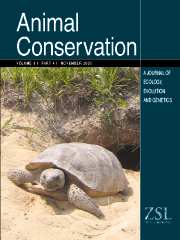Crossref Citations
This article has been cited by the following publications. This list is generated based on data provided by
Crossref.
Hedrick, Philip W.
Parker, Karen M.
Gutiérrez-Espeleta, Gustavo A.
Rattink, Annemieke
and
Lievers, Karin
2000.
MAJOR HISTOCOMPATIBILITY COMPLEX VARIATION IN THE ARABIAN ORYX.
Evolution,
Vol. 54,
Issue. 6,
p.
2145.
Daszak, Peter
Cunningham, Andrew A.
and
Hyatt, Alex D.
2000.
Emerging Infectious Diseases of Wildlife-- Threats to Biodiversity and Human Health.
Science,
Vol. 287,
Issue. 5452,
p.
443.
Hedrick, Philip W.
Parker, Karen M.
Gutiérrez-Espeleta, Gustavo A.
Rattink, Annemieke
and
Lievers, Karin
2000.
MAJOR HISTOCOMPATIBILITY COMPLEX VARIATION IN THE ARABIAN ORYX.
Evolution,
Vol. 54,
Issue. 6,
p.
2145.
Hedrick, Philip W.
Kim, Timothy J.
and
Parker, Karen M.
2001.
Parasite resistance and genetic variation in the endangered Gila topminnow.
Animal Conservation,
Vol. 4,
Issue. 2,
p.
103.
Woodroffe, Rosie
2001.
Assessing the risks of intervention: immobilization, radio-collaring and vaccination of African wild dogs.
Oryx,
Vol. 35,
Issue. 3,
p.
234.
ARTOIS, M.
DELAHAY, R.
GUBERTI, V.
and
CHEESEMAN, C.
2001.
Control of Infectious Diseases of Wildlife in Europe.
The Veterinary Journal,
Vol. 162,
Issue. 2,
p.
141.
Woodroffe, Rosie
2001.
Assessing the risks of intervention: immobilization, radio-collaring and vaccination of African wild dogs.
Oryx,
Vol. 35,
Issue. 3,
p.
234.
R. Crooks, Kevin
A. Scott, Cheryl
and
H. Van Vuren, Dirk
2001.
Exotic disease and an insular endemic carnivore, the island fox.
Biological Conservation,
Vol. 98,
Issue. 1,
p.
55.
Yamaguchi, N.
and
Macdonald, D. W.
2001.
Detection of Aleutian disease antibodies in feral American mink in southern England.
Veterinary Record,
Vol. 149,
Issue. 16,
p.
485.
Thompson, R.C.Andrew
2001.
The future impact of societal and cultural factors on parasitic disease – some emerging issues.
International Journal for Parasitology,
Vol. 31,
Issue. 9,
p.
949.
Gog, Julia
Woodroffe, Rosie
and
Swinton, Jonathan
2002.
Disease in endangered metapopulations: the importance of alternative hosts.
Proceedings of the Royal Society of London. Series B: Biological Sciences,
Vol. 269,
Issue. 1492,
p.
671.
Harvell, C. Drew
Mitchell, Charles E.
Ward, Jessica R.
Altizer, Sonia
Dobson, Andrew P.
Ostfeld, Richard S.
and
Samuel, Michael D.
2002.
Climate Warming and Disease Risks for Terrestrial and Marine Biota.
Science,
Vol. 296,
Issue. 5576,
p.
2158.
Giese, Alan R.
and
Hedrick, Philip W.
2003.
Genetic variation and resistance to a bacterial infection in the endangered Gila topminnow.
Animal Conservation,
Vol. 6,
Issue. 4,
p.
369.
Altizer, Sonia
Harvell, Drew
and
Friedle, Elizabeth
2003.
Rapid evolutionary dynamics and disease threats to biodiversity.
Trends in Ecology & Evolution,
Vol. 18,
Issue. 11,
p.
589.
Nunn, Charles L.
Gittleman, John L.
and
Antonovics, Janis
2003.
A comparative study of white blood cell counts and disease risk in carnivores.
Proceedings of the Royal Society of London. Series B: Biological Sciences,
Vol. 270,
Issue. 1513,
p.
347.
Ezenwa, Vanessa O.
2004.
Parasite infection rates of impala (Aepyceros melampus) in fenced game reserves in relation to reserve characteristics.
Biological Conservation,
Vol. 118,
Issue. 3,
p.
397.
Fiorello, Christine V.
Deem, Sharon L.
Gompper, Matthew E.
and
Dubovi, Edward J.
2004.
Seroprevalence of pathogens in domestic carnivores on the border of Madidi National Park, Bolivia.
Animal Conservation,
Vol. 7,
Issue. 1,
p.
45.
Butler, J.R.A
du Toit, J.T
and
Bingham, J
2004.
Free-ranging domestic dogs (Canis familiaris) as predators and prey in rural Zimbabwe: threats of competition and disease to large wild carnivores.
Biological Conservation,
Vol. 115,
Issue. 3,
p.
369.
CROOKS, KEVIN R.
GARCELON, DAVID K.
SCOTT, CHERYL A.
DEPUE, JOHN E.
WILCOX, JEFFERY T.
KIMSEY, ROBERT B.
and
VAN VUREN, DIRK H.
2004.
Ectoparasites of a Threatened Insular Endemic Mammalian Carnivore: The Island Spotted Skunk.
The American Midland Naturalist,
Vol. 151,
Issue. 1,
p.
35.
Lafferty, Kevin D.
Porter, James W.
and
Ford, Susan E.
2004.
Are Diseases Increasing in the Ocean?.
Annual Review of Ecology, Evolution, and Systematics,
Vol. 35,
Issue. 1,
p.
31.


